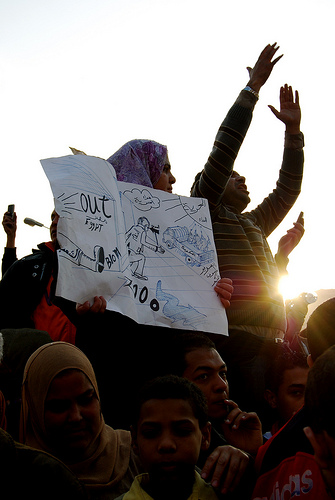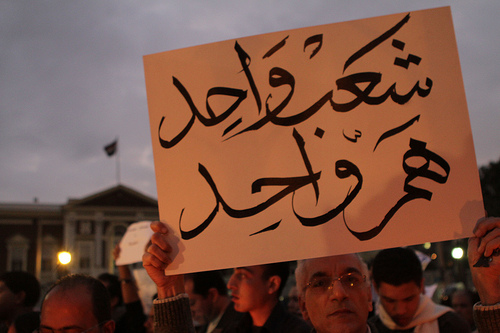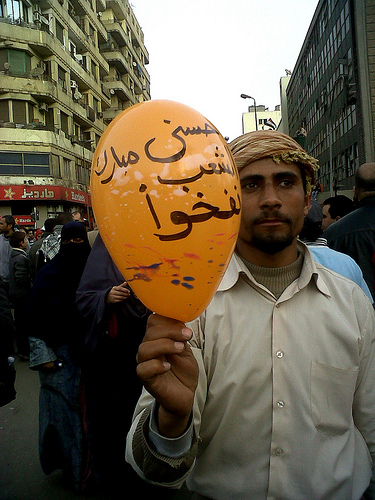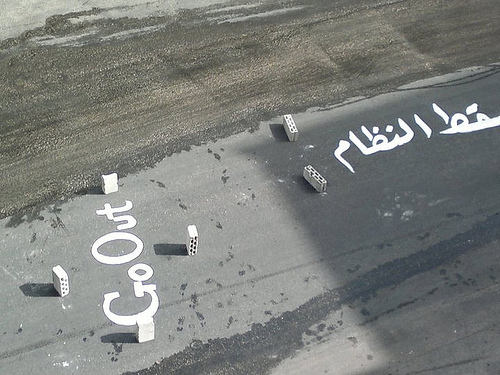
Photo credit: Rowan El Shimi via Flickr.
Arabic metaphor took on a whole new meaning in December, 2010, when a young Tunisian vendor so enraged with the confiscation of his cart set himself on fire to protest the economic conditions that drove him to choose death over silence. Exactly one month later, an Egyptian restaurant in Cairo chose the same fate. But these weren’t cut-and-dried suicides. In a world where language is lyrical, filled with innuendo, the self-immolations of Mohamed Bouazizi and Abdou Abdel-Monaam Hamadah came as rude awakening calls. The message? Poetic-speak of the past isn’t going to get you out of unemployment or even the artistic underground. Serious reform needed a new language altogether – blunt, concise, unforgiving, obstinate. To the establishment: Leave, period. The very material that protest slogans are made of.
“When they were shouting ‘People Demand the Overthrow of the Regime,’” wrote Iranian cultural scholar and Columbia University professor Hamid Dabashi, “they did not mean just the political regime; they meant also the régime du savoir and the language with which we understand and criticize things… This is the language of revolt in the Arab world. In the making of that revolt, language is everything, for language is where worlds reside: the one in which we live, and the ones awaiting emergence that have already spoken… It is also the language that makes them familiar to us.”

Photo credit: Sarah Carr via Flickr.
How the shift in language, as well as its effects on protestors’ reclaiming of public space and rewriting the metaphors that narrate the uprisings that still continue today, is one of the multiple and complex issues Dabashi takes on in his latest book The Arab Spring: The End of Postcolonialism. A culmination of over three decades of teaching and writing on mass social protests, the book is both an examination of the region’s shifting geopolitics as well as the cultural changes underway that will redefine how Middle Easterners will be understood amongst both each other and those from other countries, particularly in the West, where mainstream media has successfully manipulated many populations into thinking that “Arab,” “Iranian” or “Muslim” is synonymous with zealotry and dogmatic rule. The uprisings in the Middle East, he contends, is “not the consequence of any ideological mobilization,” but were rather “mobilized against ideologies.”
Central to Dabashi’s thesis is his argument that the Arab Spring marked “the end of the postcolonial ideological formation as we have known them for the past two hundred years. By end of postcoloniality I mean the cessation of ideological production in colonial contexts and terms–the terms determined by the European colonial domination of the region, and the tyrannical ‘postcolonial’ states left behind when the Europeans collected their flags and left.” In laymen’s terms, the uprisings that started in 2010 marked the beginning of the end of antiquated clichés such as “East vs West,” “Clash of Civilizations” and “The Orient.”
Now, he argues, a new language is taking root, one that takes authorship away from outside countries and unelected dictators and puts it in the ownership of the populace itself. But as of now, the uprisings are open-ended, far from over, and he suggests that instead of writing the pace of change off as a failed epic story, it would be best to look at the Arab Spring as an unfolding novel, a “yet-to-be-named-world.”
“In understanding what is happening in North Africa and the Middle East, we are running out of metaphors. We need new metaphors,” Dabashi explains. “Even the word ‘revolution’–understood anywhere from Karl Marx to Hannah Arendt–needs rethinking. Such a new language of the revolution will cast the impact of ‘the Arab Spring’ on national and international politics for generations to come. These uprisings have already moved past race and religion, sects and ideologies, pro- or anti-Western. The term ‘West’ is more meaningless today than ever before – it has lost its potency, and with it the notion, and condition, we had code-named post-coloniality.”

Photo credit: Monasosh via Flickr.
Essentially, a new rhetoric as to how we understand and evaluate the Middle East is already underway, and in few places is it more apparent than in the continuous stream of images of protesters holding up signs and slogans. Where language was dominated by poetry and allusion, slogans from the past two years or so are blunt, to the point. They waste no time getting the message across, and they waste no energy safeguarding against refinement or self-censorship. Participation–not politeness–is the name of the game, and by taking part in carrying phrases that can’t be traced to a single author or owner, protesters empower themselves by reclaiming language as the public space where the entire community is fueled by self-expression and self-representation. Rather than castigate, language becomes the tool to create new metaphors to understand each other through upheavals that communicate individual emotions, thoughts and experiences rather than homogenized ideologies.
“These revolutionary uprisings prove every theory of modernization, Westernization, Eurocentricity, the West as the measure of the Rest, the End of History, the Clash of Civilizations, ad absurdum, wrong,” Dabashi writes. “The world we have hitherto known as ‘the Middle East’ or ‘North Africa’ or ‘the Arab and Muslim world,’ all part and parcel of a colonial geography we had inherited, is changing.” And, Dabashi adds, “In the same way that the vacant center of Tahrir Square is populated by the changing multitudes that declare it a free republic as Egyptians come and instantly refine it, so the utterances made in it are rendered meaningful by the changing contexts of their political framings… The hybrid nature of language… always socially implicates the speech act. As such, utterances are not monological speeches; they are directed, purposeful, indexical and always implicate intertextuality. Meaning is socially invested, communally anchored. Tahrir Square is thus the physical evidence of the Egyptian novel… Tahrir Square is the ground zero of the first novelistic revolution in and for the future of Egypt and the rest of the Arab world, a revolution with multiple cadences, utterances.”
For almost two years now, countless experts and scholars have analyzed the Arab Spring through its history, politics, economic factors and the social pressures that lead to regional breaking points. Yet what sometimes gets lost, especially when we pay more attention to mainstream news coverage of the Muslim Brotherhood and “anti-Western” protests, is that without the basic fundamentals of culture and expression, there would be no foundation with which to envision or articulate reform. “Poets, novelists, filmmakers, singers and songwriters,” Dabashi states, “they are the real theorists of the Arab Spring.”
Expression–be it passive, artistic or even immolation–is metaphor, the language we use to salvage narratives when they’re taken away and to redraft knowledge when it’s omitted from our awareness and hidden in contrived concepts that are more rooted in abstracts and prejudice than experience and understanding. It is this metaphor we must remember when it feels all-too-easy to write these revolutions off as failed experiments in democracy and reform. Democracy, as a rapper friend of mine in Cairo put it, is not a quick-fix pill.




